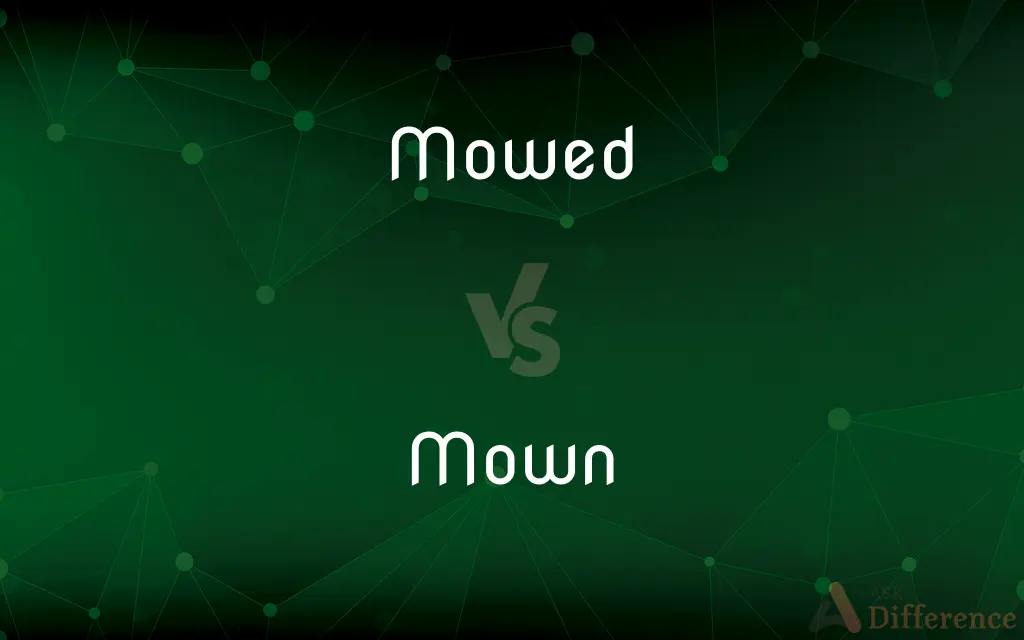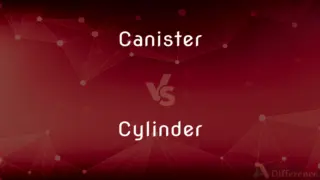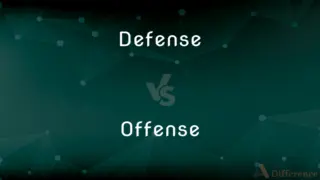Mowed vs. Mown — What's the Difference?
By Urooj Arif & Fiza Rafique — Updated on March 8, 2024
Mowed is the past tense of "mow," indicating the act of cutting down grass or grain, while "mown" is the past participle, used with auxiliary verbs to describe something that has been cut down.

Difference Between Mowed and Mown
Table of Contents
ADVERTISEMENT
Key Differences
"Mowed" specifically refers to the action completed in the past, as in directly cutting grass or crops. For instance, when someone says, "I mowed the lawn yesterday," it indicates that the person performed the action of mowing. On the other hand, "mown" is used to describe the state of something after the action has been completed, often in conjunction with "have," "has," or "had." For example, "The lawn has been mown" implies that the action of mowing occurred, leaving the lawn in a cut state.
In terms of usage, "mowed" focuses on the act itself and is often used to discuss the action in a straightforward manner. "Mown," however, emphasizes the result or condition resulting from mowing. This distinction highlights the role of "mowed" in indicating direct action, whereas "mown" points to the aftermath or the completed state.
The choice between "mowed" and "mown" depends on the sentence construction. When describing an action taken by a subject, "mowed" is appropriate. Conversely, "mown" is suitable for passive constructions or when highlighting the outcome, as in "The field is neatly mown."
Both terms are integral to discussions about lawn care, agriculture, or any context involving the cutting of grass or crops. While "mowed" is often associated with the physical process, "mown" can also convey a sense of completion and the appearance of the area after mowing.
In literary or descriptive writing, "mowed" might be used to create a sense of action or to depict a scene dynamically. "Mown," however, could be employed to describe a serene, completed scene, invoking a sense of tranquility or order achieved after the activity of mowing.
ADVERTISEMENT
Comparison Chart
Form
Past tense
Past participle
Usage
Direct action
Result or condition after action
Sentence Type
Active voice
Passive voice or describing state
Example
I mowed the lawn on Saturday.
The lawn has been mown recently.
Emphasis
On the act of mowing
On the aftermath of mowing
Compare with Definitions
Mowed
Cut down grass or grain.
He mowed the lawn before the rain started.
Mown
Grass or grain that has been cut down.
The mown grass smelled fresh.
Mowed
Refers to the act at a specific time.
They mowed the park yesterday for the event.
Mown
Outcome-focused.
The mown paths through the meadow were inviting.
Mowed
Action-focused.
After he mowed the area, it looked much better.
Mown
Emphasizes the completion.
With the wheat mown, the harvest was ready.
Mowed
Direct involvement in action.
I mowed the backyard quickly.
Mown
State after mowing.
The field looked beautiful, neatly mown.
Mowed
Performed the action of cutting down.
She mowed the entire field in an afternoon.
Mown
Used with auxiliary verbs.
The lawn has been mown for the weekend.
Mowed
To cut down (grass or grain) with a scythe or a mechanical device.
Mown
(of grass or a crop) cut down with a scythe or machine
The delicious smell of newly mown grass
Their job was to rake the mown corn ready for carting
Mowed
To cut (grass or grain) from
Mow the lawn.
Mown
To cut down (grass or grain) with a scythe or a mechanical device.
Mowed
To cut down grass or other growth.
Mown
To cut (grass or grain) from
Mow the lawn.
Mowed
Simple past tense and past participle of mow
Mown
To cut down grass or other growth.
Mown
Past participle of mow
Mown
Cut down by mowing, as grass; deprived of grass by mowing; as, a mown field.
Mown
(used of grass or vegetation) cut down with a hand implement or machine;
The smell of new-mown hay
Common Curiosities
Which is correct: "The lawn is mowed" or "The lawn is mown"?
"The lawn is mown" is typically more correct, especially when emphasizing the lawn's state after mowing.
Can "mowed" and "mown" be used interchangeably?
They are not directly interchangeable since "mowed" is used for actions in the past tense and "mown" for the past participle, often in passive constructions.
How do I know whether to use "mowed" or "mown"?
Use "mowed" when referring to the action of cutting grass or crops. Use "mown" when focusing on the result or state after the action, particularly in passive voice sentences.
Are there any exceptions in using "mowed" and "mown"?
Usage can depend on regional preferences and the context of the sentence, but generally, the rules for their use are consistent.
Can "mown" be used without auxiliary verbs?
"Mown" typically appears with auxiliary verbs like "has," "have," or "had" to form perfect tenses or in passive constructions.
Is "mown" outdated?
While "mown" might seem less common in everyday conversation, it is not outdated and is used in specific contexts to describe the state after mowing.
Is "The grass is mowed every week" grammatically correct?
Yes, it's correct, but it focuses on the routine action of mowing. "The grass is mown every week" would emphasize the state of the grass being kept cut.
Do "mowed" and "mown" have the same pronunciation?
Yes, they are pronounced the same.
Why are there two forms, "mowed" and "mown"?
English often has two forms for the past tense and past participle of verbs, especially in verbs of Germanic origin, to convey different grammatical aspects.
How do "mowed" and "mown" relate to other verbs with similar forms?
Like "mowed" and "mown," many English verbs have distinct past tense and past participle forms for active and passive uses, respectively.
Does the use of "mowed" vs. "mown" affect the meaning of a sentence?
Yes, the choice between them can subtly change the focus from the action itself to the result of the action.
Can "mowed" and "mown" be used in future tense?
Yes, but with auxiliary verbs, as in "will have mowed" or "will be mown," to indicate future actions and their outcomes.
What's the importance of using "mowed" and "mown" correctly?
Correct usage enhances clarity and grammatical accuracy in conveying actions and their outcomes.
Can "mowed" be used in a passive sentence?
It's less common and might sound awkward; "mown" is preferred in passive constructions.
Are there modern trends in the usage of "mowed" and "mown"?
Modern usage tends to simplify language, so "mowed" might be seen more frequently, but "mown" is still correct and used in formal contexts.
Share Your Discovery

Previous Comparison
Canister vs. Cylinder
Next Comparison
Defense vs. OffenseAuthor Spotlight
Written by
Urooj ArifUrooj is a skilled content writer at Ask Difference, known for her exceptional ability to simplify complex topics into engaging and informative content. With a passion for research and a flair for clear, concise writing, she consistently delivers articles that resonate with our diverse audience.
Co-written by
Fiza RafiqueFiza Rafique is a skilled content writer at AskDifference.com, where she meticulously refines and enhances written pieces. Drawing from her vast editorial expertise, Fiza ensures clarity, accuracy, and precision in every article. Passionate about language, she continually seeks to elevate the quality of content for readers worldwide.













































